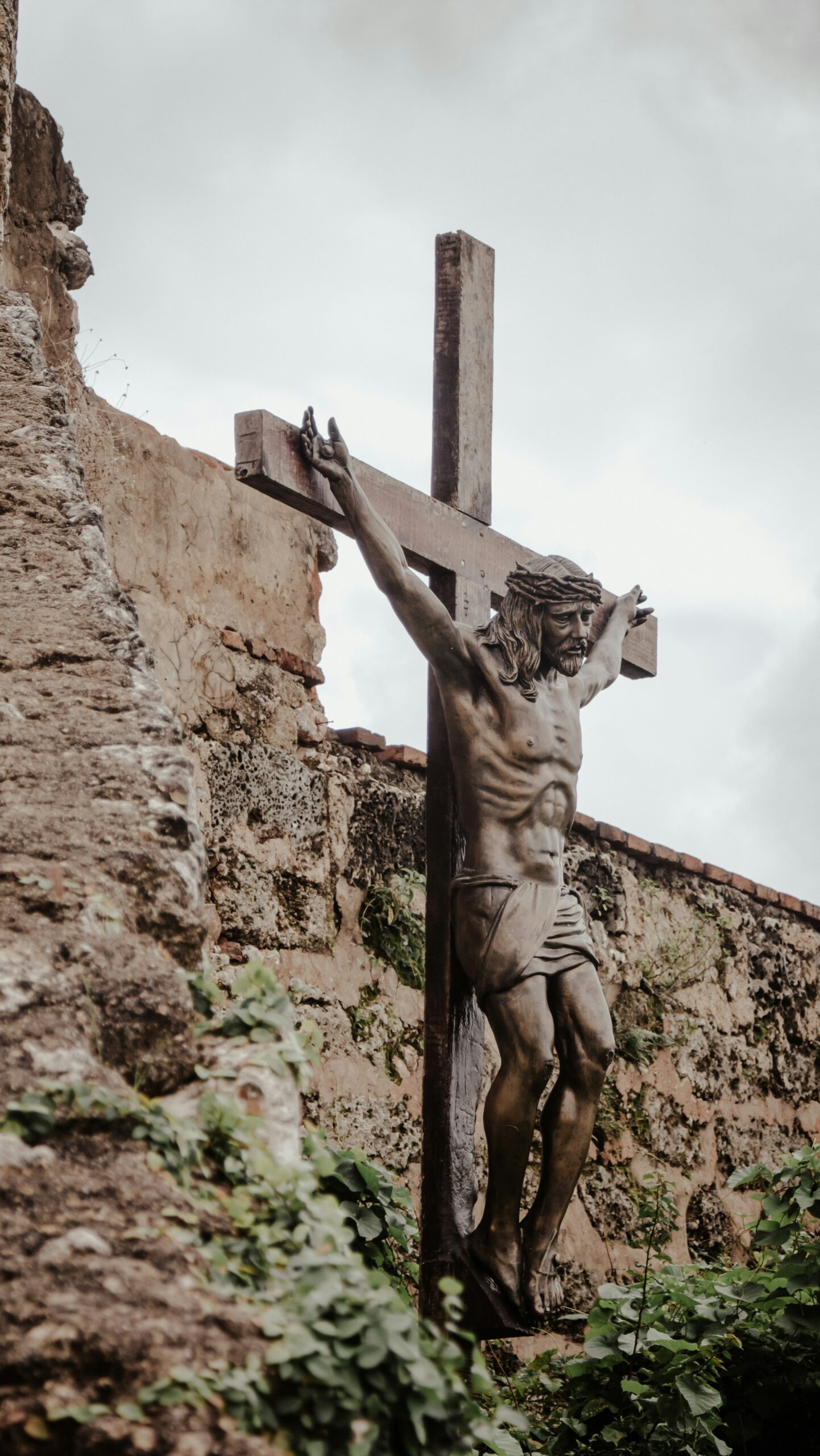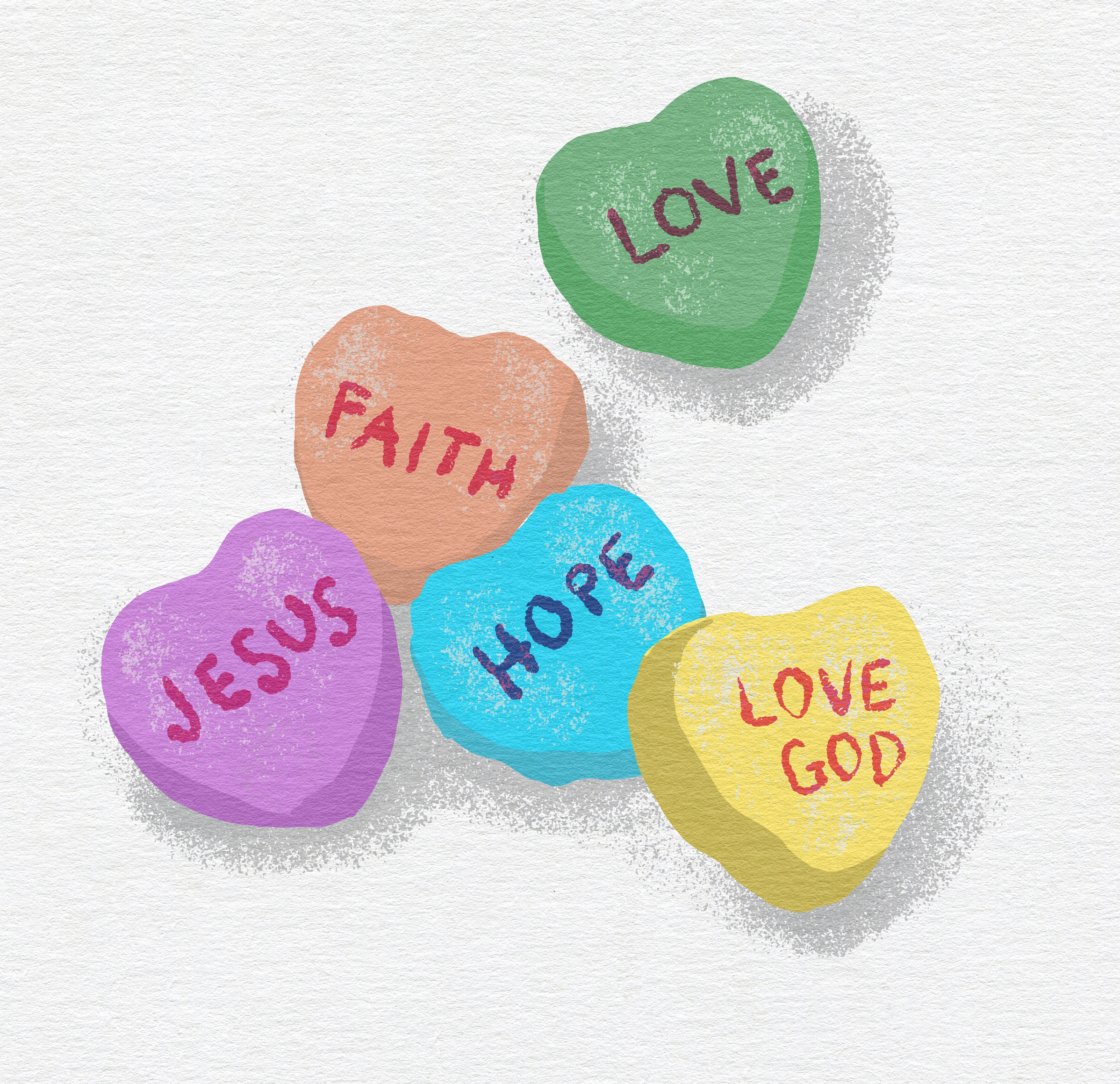THE CONNECTION
27
Mar '25

April 2025 Connection
Posted on Mar 27, 2025 in BLOG, Newsletter |
27
Mar '25

“See How He Died?”
As we draw closer to Holy Week and the services of Palm Sunday, Maundy Thursday, Good Friday, and of course Easter, I want to invite us to begin our month of April with a reflection on Jesus’ death. I realize that an Easter article might be more cheery, but without the cross, there is no Easter.
For century upon century, theologians have been asking “why did Jesus die?” It’s a question aimed at what we call “atonement theory.” Atonement theories explore the nuance of why Jesus had to die. Again and again in the Gospels, we read about it being a fulfillment of prophecy, or as John the Baptist proclaims, Jesus is “the Lamb of God who takes away the sins of the world.” Atonement theory acknowledges that the crucifixion seemed to be part of God’s plan, but “why?”
But I’ve always wondered if we were asking the wrong question (why?). Would we be better off with a different question: “Look! See how he died?”
I heard a pastor say, about the crucifixion, that, whether or not Jesus crucifixion was part of God’s plan, it was inevitable. In other words, there is absolutely no way in this world that Jesus could teach about a new kingdom, demand justice for the “other,” and throw a wrench in the works of the status quo, and get away with it. What Jesus did, no matter how right it was in hindsight, meant that he’d be crucified. If it was God’s plan, then it was perfectly put into motion!
This perspective invites us to move away from the question of “why?” An answer to that becomes quite evident: there was no way he was going to do what he did and say what he said and get away with it! So, let’s try a different question: “Look! See how he died?”
Jesus, the incarnation of God, so deeply in love with this world and God’s own creation, was determined for us to know the depths of God’s love that he was willing to face the consequences of such love, however unjust they would be.
Look! See how he died?
Jesus, so set on conveying the possibility of God’s kingdom on earth as in heaven, he spread his arms, accepted the thorns, endured the nails, and suffered on the cross that we might know the depths of grace.
Look! See how he died?
Jesus, God’s very self, was willing to go from the cross to the grave so that we might understand that what seems so final on this earth has no sting, no hold, no grip on us. Death is swallowed up in victory.
Look! See how he died? And now…see how he rises?
Peace,
Pastor Brian
Read more...
01
Mar '25

March 2025 Connection
Posted on Mar 1, 2025 in BLOG, Newsletter, Uncategorized |
01
Mar '25

Compass Group Invitation
They devoted themselves to the apostles’ teaching and to fellowship, to the breaking of bread and to prayer. Everyone was filled with awe at the many wonders and signs performed by the apostles. All the believers were together and had everything in common. They sold property and possessions to give to anyone who had need. Every day they continued to meet together in the temple courts. They broke bread in their homes and ate together with glad and sincere hearts, praising God and enjoying the favor of all the people. And the Lord added to their number daily those who were being saved. -Acts 2:42-47
Dear church!
I am very excited to announce that at the end of March, we will be launching our first few Compass Groups – GBUMC’s version of a small group ministry. Starting with 3-4 small groups, we’ll look forward to growing as the ministry builds momentum. These small groups will be an opportunity for individuals, couples, families, etc. to grow in their faith with others from GBUMC, as well as those who are invited to come and see what the Compass Group ministry is all about. What we are looking forward to is this:
1. Compass Groups, as our small group ministry, will provide one of the most effective tools for growing the church through invitation, community building, and small group relationships.
2. Compass Groups will help to connect and equip church family who desire to grow in their faith, grow in their relationships with others, and grow in their service to others.
3. Compass Groups will help us integrate new members into the life of the
church much quicker and with greater satisfaction.
2. Compass Groups will help to connect and equip church family who desire to grow in their faith, grow in their relationships with others, and grow in their service to others.
3. Compass Groups will help us integrate new members into the life of the
church much quicker and with greater satisfaction.
And while these are not the only reasons, I hope that they give you some insight into what makes small group ministry so meaningful. And so, I want to invite you to join me, our Compass Group H.O.S.T.s (you’ll have to come to learn what a H.O.S.T. is), and one another as we kick off our Compass Group small group ministry on Sunday, March 23rd from 1-2:30pm in the Fellowship Hall. Refreshments will be provided. If you are interested in learning more about our small group ministry and maybe even joining one of our first Compass Groups, I truly hope that you’ll come. Keep an eye out for more information coming out as that date draws closer.
Friends, I am incredibly excited for this new chapter in our church’s life. I truly believe that the impact of small groups on this church will be powerful and even transformative.
Peace,
Pastor Brian
Read more...
07
Feb '25

February 2025 Connection
Posted on Feb 7, 2025 in BLOG, Newsletter |
07
Feb '25

“Lions, Hyenas, and Peace…Oh My!”
The wolf will live with the lamb, the leopard will lie down with the goat, the calf and the lion and the yearling together; and a little child will lead them. The cow will feed with the bear, their young will lie down together, and the lion will eat straw like the ox. The infant will play near the cobra’s den, and the young child will put its hand into the viper’s nest. They will neither harm nor destroy on all my holy mountain, for the earth will be filled with the knowledge of the Lord as the waters cover the sea. -Isaiah 11:6-9
I recently learned what I assumed was useless trivia, until I realized how strangely familiar it is. Hyenas will hunt in packs, and when doing so, often have the same diet as the much hungrier and much stronger lion or lioness. In order to feast, one hyena will go after the lion’s entrée, only to become the focus of the lion’s rage. Needless to say, lions are not great at sharing. While the lion is distracted by the scapegoat hyena, the other pack members will enjoy what was once the lion’s dinner.
Yes, you read that right. In order for the pack to eat, one hyena needs to sacrifice themselves to the lion. While, on one hand, that might sound noble, on the other hand, it’s quite troubling. In this scenario, there is no real winner in the smorgasbord mess. The lion doesn’t eat, at least one hyena loses its life, and the other hyenas, while sharing their new-found feast, question the decaying trust in their pack.
It’s all a far cry from the vision Isaiah shares of God’s kingdom.
Now, before we got into all of the wildlife drama, I mentioned that the whole thing stood out to me as being strangely familiar. It’s not because I’ve witnessed it. Trust me, the only lions I’ve seen were behind thick glass at the Detroit Zoo, and they were most definitely sleeping. Rather, it seemed familiar because, so often in our world, we find ourselves thriving at the expense of another – some we know and some we don’t. Sometimes we’re the lion who is made to feel defensive of what we have and are afraid to lose. Sometimes we’re the hyenas who benefit only when our neighbor fails. And sometimes, we’re the hyena who is sacrificed by the pack. And, yes – sometimes we’re the gazelle who wandered too far from the herd.
As disciples of Jesus Christ, we find ourselves praying a prayer that invites God’s kingdom to come “on earth as it is in heaven.” We become like Isaiah, envisioning all of God’s creation lying, living, and playing together. To be clear, this is not my advocacy for vegetarianism. I’m all for the circle of life, the food chain and such. What I’m getting at is that we need to strive for a world in which our neighbor can eat while we’re still thriving. We need to desire to be, ourselves, a nation that can welcome the sojourner desiring a life of safety and prosperity, while we can enjoy the same. We need to advocate for a society in which mutual dignity and worth is not a zero-sum game in which some must lose for others to win. In other words, we need to join Isaiah in a dream wherein we can exist for one another, and not in spite of one another.
Peace.
Pastor Brian
Pastor Brian
Read more...
30
Dec '24

January 2025 Connection
Posted on Dec 30, 2024 in BLOG, Newsletter |
30
Dec '24

Generosity in the Off Season
In his December newsletter article from The United Methodist Foundation of Michigan, Rev. David Bell shared the following article entitled: Embracing Christian Stewardship: Nurturing Generosity and Responsibility. I’m sharing this article for two reasons. The first is that I believe it is a wonderful reminder of what Christian Stewardship is! The second is that I firmly believe that we ought to talk about stewardship, generosity and our responsibility for both more than just once a year as we hand out pledge cards. And so, to a congregation that is known for, among other things, generosity, I encourage you to take a moment and read Rev. Bell’s message.
Peace,
Pastor Brian
Pastor Brian
“At its core, Christian stewardship is about recognizing that we are not owners but rather caretakers of God’s creation. This perspective fundamentally shapes how we view our possessions, talents, time, and resources. It challenges us to shift our focus from selfish accumulation to selfless service, from consumption to contribution.
One of the central themes of Christian stewardship is the concept of tithing – the practice of giving a portion of one’s income to support the ministry of the church and to help those in need. While the act of tithing is often associated with financial giving, it extends far beyond mere monetary contributions. It encompasses the holistic stewardship of all aspects of our lives. Stewardship invites us to reflect on the question: How can we use our gifts and graces to bless others? This mindset fosters a spirit of generosity that goes beyond meeting our own needs to actively seeking ways to uplift and empower those around us. Whether it’s volunteering at a local shelter, mentoring a struggling youth, or simply offering a listening ear to someone in distress, every act of kindness is an expression of stewardship.
Moreover, Christian stewardship compels us to be mindful of the impact of our choices on future generations. It calls us to be responsible stewards of God’s creation by advocating for policies and investing with value-aligned principles that promote sustainability and justice. It challenges us to confront issues of inequality and injustice and to recognize that these systemic problems are not just social obstacles but moral imperatives that demand our attention and action.
In practicing Christian stewardship, we find fulfillment and purpose beyond material wealth or personal gain. We discover the joy of giving, the satisfaction of making a difference, and the peace that comes from living in alignment with our values. Christian stewardship is a sacred calling to participate in God’s ongoing work of renewal and reconciliation in the world.
Ultimately, Christian stewardship is a journey – a continual process of growth and transformation as we learn to live more fully into the abundant life that God desires for us. It invites us to cultivate a mindset of abundance and to trust in God’s provision and grace as we seek to share our blessings with others.
In a world marked by division, greed, and uncertainty, the message of Christian stewardship offers a beacon of hope and healing. It reminds us that we are all interconnected as children of God and called to love and care for one another as faithful stewards of God’s gifts. May we embrace this sacred calling with a spirit of humility, gratitude, and generosity, knowing that in serving others, we are truly serving the One who has entrusted us with all.”
Read more...
27
Nov '24

December 2024 Connection
Posted on Nov 27, 2024 in BLOG, Newsletter |
27
Nov '24

“Mark’s Christmas”
About that time, Jesus came from Nazareth of Galilee, and John baptized him in the Jordan River. While he was coming up out of the water, Jesus saw heaven splitting open and the Spirit, like a dove, coming down on him. And there was a voice from heaven: “You are my Son, whom I dearly love; in you I find happiness.”… After John was arrested, Jesus came into Galilee announcing God’s good news, saying, “Now is the time! Here comes God’s kingdom! Change your hearts and lives, and trust this good news!” -Mark 1:9-11, 14-15
As it is December, and we’re in the midst of Christmas, I wanted to share with you this wonderful Christmas passage! No, I didn’t insert the wrong passage from the wrong Gospel. This is the Christmas story! It’s just not the one we’re most familiar with. It’s not the one we decorate our mantle or altar with, and it’s not going to be illustrated on too many Christmas cards. So…how is it a Christmas story?
Strictly speaking, it’s not a Christmas story…at least not in the traditional sense. To be clear, only the Gospels of Matthew and Luke tell us anything about Jesus’ birth, and even with those two Gospels, Matthew’s focus is primarily on the coming of the Magi. It’s in Luke that we – along with Charles Shultz (“Peanuts”) – find the shepherds, a room-less inn, a manger, and the heavenly hosts. So, what are Mark and John up to?
John, while a wonderful Gospel, opted for a beginning that is a bit more poetic: “In the beginning was the Word, and the Word was with God, and the Word was God…” Again, it’s amazing and full of good news, but not necessarily a description of Grandma’s favorite nativity set.
And then, there’s Mark. Mark begins his Gospel with the Baptism of Jesus. Mark takes a running start and jumps over about 30 years of Jesus’ life. Is it because Mark doesn’t like shepherds or has something against Bethlehem? Not at all! Mark just sees the baptism of Jesus by John the Baptist as the start of Jesus’ real life. Mark starts with the baptism as his way of saying, “it is HERE that we discover the Lordship of Jesus. Sure, the manger, shepherd, angels, and all were important, but it’s in the baptism that we discover that Jesus really is Lord – the Messiah.” For Mark, the proverbial “birth story” is found in the proclamation that Jesus is God’s son. Not as cute, but just as meaningful!
Okay, if that sounds way too nerdy, it’s okay. I am nerdy, so your thinking is on point! But this nerdy stuff gets really cool!
I promise…
In Mark 1:15, right after his baptism, Jesus enters the region of the Galilee and begins to shout (kind of like the town crier), “Now is the time! Here comes God’s kingdom! Change your hearts and lives, and trust this good news!” Once again, to put it in other words, “God is present! The incarnation of God is here! It’s time to straighten up and fly right! Sounds kind of Christmasy, doesn’t it? Jesus, the incarnation of God, is born into the world, not in the way the world expects, but in precisely the way the world needs!
Now, don’t get me wrong, I still love a good nativity scene, and the image of baby Jesus lying in a feeding trough – it’s important! But this Christmas, I’d love to start a new tradition. Just as we’re getting ready to sing “Joy to the world” on Christmas Eve, I want to close my eyes and imagine that Jesus is walking into the sanctuary, all while shouting, “Now is the time! Here comes God’s Kingdom! Change your hearts and lives, and trust in this good news.”
Mark’s Christmas might be just what we need this year.
Peace,
Pastor Brian
Pastor Brian
Read more...
31
Oct '24

November 2024 Connection
Posted on Oct 31, 2024 in BLOG, Newsletter |
31
Oct '24

Fruitfulness in Leadership
In Paul’s letter to the Galatian church – one of the early church communities – Paul is addressing the church’s tendency to live according to what we might call the “old ways.” Here, I’m not talking about the “old ways” as in, playing until the street lights come on, but rather, the old ways of living that they had put behind them when they took on their claim of faith in baptism. In other words, the Galatians kept turning to ways that were not of God rather than the ways God desires us to live. So, that then begs the question, how do we know what the ways of God are? Paul tells us when he describes the “fruit of the spirit”:
…the fruit of the Spirit is love, joy, peace, patience, kindness, generosity, faithfulness, gentleness, and self-control. There is no law against such things.
-Galatians 5:22-23 (NRSVUE)
When I read this passage in which Paul describes the fruit of the Spirit, I always think of a mirror. Not like one of those full-length ones, but rather a mirror to the soul. When I look in that mirror, do I see these fruits? While I’d like to say that I always do, the truth is, there are times when some are missing from my life. It’s in those moments that it becomes important to not simply dismiss it as human imperfection, but to strive to grow in those areas of fruitfulness until they become more present. Quite simply, as someone who claims my Christian baptism, I owe it to my neighbors and my communities to be as reflective of the fruit of the Spirt as I’m able.
In the coming weeks, as we make decisions about who will be in positions of leadership in our communities, our state, and in our nation, as well as in many other aspects of our lives, it is my hope that we are looking for the presence of the fruits of the Spirit. It is my hope that those to whom we entrust the obligation of leadership would seek out these fruits of the Spirit. Honestly, I worry that to look for and demand anything else from those in leadership roles would be to find ourselves falling into the trap of the Galatian church, putting our hope and trust in the “old ways” rather than in the ways of God’s Holy Spirit.
May we recommit ourselves to the ways of God’s Holy Spirit, recommit ourselves to our own correction when our fruitfulness becomes a bit incomplete, and may we ask the same of those we invite into positions of leadership.
Peace,
Pastor Brian
Pastor Brian
Read more...
30
Sep '24

October 2024 Connection
Posted on Sep 30, 2024 in BLOG, Newsletter |
30
Sep '24

Holy (Elevator) Friends
Back in June, I joined a group of great friends for dinner and an escape room. The dinner was delicious BBQ in Traverse City, and the escape room was an Alcatraz warden’s office with a time limit of 1 hour. With our collective brains, wit, and laughter, we managed to complete the escape room with about 20 minutes to spare. Sure of ourselves that we must have broken the record, our egos were struck down when we were informed that groups had done it much faster (and better). Oh well!
What happened next, we didn’t expect. We found ourselves in another escape room. This time, the escape room was an elevator. A very real elevator where the only escape option was the Traverse City Fire Department. There we were on a hot June day with eight of us crammed into a stuck elevator waiting for either a short fall, a rescue, or heat exhaustion.
But truth be told, it actually made for a lot of laughter, fun, and happy memories. We were assured the elevator didn’t get stuck because of our weight (what a relief), nor because it was hanging on by a thread, waiting to fall. Instead, it was a failsafe mechanism that tripped, requiring time and a little know-how.
I tell this story to say that I couldn’t imagine being stuck in an elevator with anyone else. These are truly some of the best friends I could ask for, and I am continually thankful that they are in my life. My prayer is that you are lucky enough to have people like that in your life – let’s call them “elevator people.”
I recently heard a pastor talk about the value of holy friendships. To be clear, these are not friends who are more holy. Instead, these are friends we have in our life who lift us up and who we can see, not only as parts of our lives, but also part of our spiritual journey. They are people who lift us up, pray for us, support us, challenge us, weep and laugh with us. They are elevator friends who will be with you when life gets incredibly challenging, and when things are moving along swimmingly.
And, if you’re reading this and find yourself all to much aware that you don’t have these holy friends in your life, I want to simply remind you that your church is full of holy friends – if you’ll allow it.
I’m thankful for my friends – my holy friends – who God has placed in my life. I am thankful for their wisdom, their laughter, and their willingness to journey with me through this journey of life and faith.
Who are your holy friends – or, who will you let be your holy friends?
With love,
Pastor Brian
Read more...
29
Aug '24

September 2024 Connection
Posted on Aug 29, 2024 in BLOG, Newsletter |
29
Aug '24

Appreciating Elephants
Have you ever noticed that there are an extremely wide variety of holidays that seem to pop up. A while ago, I learned that there is a national “Talk Like a Pirate Day” (September 19th), Pie Day (March 14th) and even Star Wars Day (May 4th.) Well, did you know that there is Elephant Appreciation Day (September 22nd?) Maybe you did know it, but simply forgot (Haha…an elephant joke). But the elephants have not forgotten about it (another elephant joke.) And so, it seems appropriate that we show appreciation for elephants. Ready? Go!
Okay, why did I start this article talking about Elephant Appreciation Day? Is it because it’s a September holiday? No, there are tons of others to choose from! I chose it simply so we could talk about memories – or more specifically, remembering. Elephants are said to do that very well. Christians? Well, we do it too!
In Ephesians, Paul tells the people of the Ephesian church: “For this reason, ever since I heard about your faith in the Lord Jesus and your love for all God’s people, I have not stopped giving thanks for you, remembering you in my prayers.” (Ephesians 1:15-16.)
Here, Paul is simply offering a reminder through his letter that he is remembering them in his prayers. We don’t really need to read into it. You see, Paul can’t always be with the new church starts. Instead, he’s writing to encourage, commend, and at times admonish, as well as sending other missionaries to be with those who are, with him, striving to be faithful followers of Christ’s gospel. In other words, Paul is seeking to give care to the church when he could not be present.
And so, I write this article with the same sentiment. In my prayers, I am remembering you and giving thanks for you. While we cannot always be together, it does not stop me from this kind of spirit-connection. And the same can be true for all of us. While we all may not be together 24/7 (in fact, I assure you, we are not,) we can remember and give thanks for one another.
Let me close with the words from a wonderful hymn that reminds us of the same: “Blest Be the Tie That Binds”
Blest be the tie that binds
Our hearts in Christian love;
The fellowship of kindred minds
Is like to that above.
Our hearts in Christian love;
The fellowship of kindred minds
Is like to that above.
Your brother in Christ,
Pastor Brian
Pastor Brian
Read more...
31
Jul '24

August 2024 Connection
Posted on Jul 31, 2024 in BLOG, Newsletter |
31
Jul '24

“What Tomorrow Will Bring”
“Therefore, I say to you, don’t worry about your life, what you’ll eat or what you’ll drink, or about your body, what you’ll wear. Isn’t life more than food and the body more than clothes? Look at the birds in the sky. They don’t sow seed or harvest grain or gather crops into barns. Yet your heavenly Father feeds them. Aren’t you worth much more than they are? Who among you by worrying can add a single moment to your life? -Matthew 6:25-27 (CEB)
Charles Dickens is famous, in part, for his oft quoted line, “It was the best of times, it was the worst of times.” I’ll add to it my own tidbit: “But, not matter what it was, at least we knew what it was.” You see, looking back, we have the benefit of having lived through our past, and so, good or bad, we know it, which makes it either a wonderful, cherished memory, or, at the very least, something we made it though. The future, however, is a whole different ballgame. The future is unknown! The future, while we know it will contain moments of good, we also know that it will have difficult – even bad – moments. The problem is, we don’t know what they will be, when they’ll be, how we’ll navigate any of it, who will be involved, and where it will leave us.
Take a deep breath.
The phenomenon of it all is that this is and always has been true. Somehow, the passage of time just puts things of the past in perspective, making yesterday look like the good old days, and leaving tomorrow look like we’re on the precipice of living out Dante’s “Inferno.”
Jesus understood this about us. In fact, if we go back to the stories of the Bible, we’ll find instance after instance in which people longed for the “good old days,” not because they were necessarily better, but because they were known! And so, Jesus offers us this reminder: “Don’t worry about your life, what you’ll eat or what you’ll drink, or about your body, what you’ll wear…Who among you by worrying can add a single moment to your life.” Here, Jesus is reminding us that our worry about the future, while not entirely without good reason, doesn’t ultimately help us. Instead, it simply gets in our way of living in the here and now. Worrying about the future simply because we can’t predict it doesn’t make today any better, nor does it make tomorrow any easier. In fact, what we know of anxiety, worrying unrealistically about tomorrow will likely make things worse.
Let’s consider an example from a long, long time ago. Imagine a cave-dwelling people, who became convinced that right outside their cave entrance was a sabretooth tiger ready to pounce the moment they emerged from the cave. Is this an entirely unfounded fear? No, probably not. If you hear the tiger’s snarl, stay inside. That’s a no-brainer. But what if every day our cave dwelling friend refused to leave the cave because of this possibility. Day and night, without ever hearing, seeing, or even smelling the sabretooth tiger, they determined that it’s just too risky. The anxiety they experience has now limited their tomorrows.
When are we like our cave-dwelling friend? When do we let our anxiety get the better of us, assuming that tomorrow is out to get us, that we stand on the precipice of doom? What steps to do we need to take – as individuals, as the church, as society, as creation – to emerge from the cave and experience all of tomorrow? Will there be challenging and difficult moments? Of course there will be. But will there be good times and moments worthy of our celebration? You bet!
And so, I close this thought process and article with these words from the Prophet Isaiah:
“Don’t fear, for I have redeemed you; I have called you by name; you are mine. When you pass through the waters, I will be with you; when through the rivers, they won’t sweep over you. When you walk through the fire, you won’t be scorched and flame won’t burn you. I am the Lord your God, the holy one of Israel, your savior.” -Isaiah 43:1b-3a (CEB)
Peace,
Pastor Brian
Read more...
27
Jun '24

July 2024 Connection
Posted on Jun 27, 2024 in BLOG, Newsletter |
27
Jun '24

Go Therefore…Together
Now the eleven disciples went to Galilee, to the mountain to which Jesus had directed them. When they saw him, they worshiped him, but they doubted. And Jesus came and said to them, “All authority in heaven and on earth has been given to me. Go therefore and make disciples of all nations, baptizing them in the name of the Father and of the Son and of the Holy Spirit and teaching them to obey everything that I have commanded you. And remember, I am with you always, to the end of the age.” -Matthew 28:16-20 (NRSVUE)
“Go therefore…”
Those words have haunted Christians for generations. For some, it’s because it invites them beyond their comfort zone. “No thanks, God. I’d rather just stay right where I am, thank you very much!” For others, it’s because that word “therefore” means that we actually have to do something with the gospel, and the gospel isn’t always received very well by everyone. Dietrich Bonhoeffer, 20th century theologian, reminded us of this as he talked about the “cost of discipleship.”
Still, for others, the words “go therefore” became haunting because it created significant confusion: What is our mission field? Is it the whole world? Is it our own backyard? Is it only the poor and disenfranchised? Is it everyone? To be fair, the apostles wrestled with this question in a really big way, and the questions haven’t gone away ever since!
Two years ago, as I was getting ready to go with our Appalachia Service Project (ASP) team, I found myself asking this same question: Go therefore…but where? In 2022, we were headed to Harlan, KY. That answered the where part of the question, but what lingered was the question that always follows: “But, what about…?” You see, it’s this question that requires us to see that the mission field is vast! It includes Appalachia, but it also includes Grand Blanc. It includes Flint, Detroit, Haiti, Liberia, Australia, and every single place in between. Our missional imperative is to all nations, all people, all places, in all times, and in all spaces.
As you can see, my struggle with this question of “Go therefore…but where?” wasn’t fully answered. What I struggled with was the reality that, while mission and ministry in Appalachia was, and is still, vitally important, so is mission and ministry here. And so is it important in every space under the sun. Suddenly, the magnitude of “Go therefore…” began to come into view, and a new question came to mind: How can we possibly fulfill the magnitude of the great commission? How could we possibly meet the missional needs of our neighbors near, far and everywhere in between? How could we possibly proclaim the gospel news in all places to all people?
The answer that came to me is this: Notice in verse 16 how it was the eleven disciples who had come together. The resurrected Christ came to the disciples as they were gathered together. Jesus didn’t commission each one separately. Rather, he commissioned them together. That’s the word that releases us from the daunting and sometimes haunting words “go therefore.” We move out of our comfort zones together. We walk into and accept the cost of our discipleship, not alone, but together. We meet the magnitude of our commission – our missional imperative – together.
In other words, “go therefore” is not the commission given to one Christian or one church. It is the commission given to all of us. It is our collective task, and it invites us respond with a “yes!” Yes to mission and ministry in our own backyard. Yes to mission and ministry in spaces we don’t call home. Yes to mission and ministry that takes us to meet new neighbors. Yes to mission and ministry that widens the circle. Yes to mission and ministry that compels us to see the image of Christ in one another. The commission given to each of us “Go therefore…” is made to all of us, collectively.
And so, on June 30, 2024, a team of ASP volunteers departed from GBUMC to go and serve our neighbors whom we’ve yet to meet in Knott County, KY. We’re proclaiming the gospel with tools, sweat, love, and friendship. And now, as we prepare to come home to our own backyard, we’re ready to do the same for the neighbors we know. Our circle will grow wider, and we’ll have done it…together.
With you and for Christ,
Pastor Brian
Pastor Brian
“Do all the good you can, by all the means you can, in all the ways you can, in all the places you can, at all the times you can, to all the people you can, as long as ever you can.” ― John Wesley
Read more...